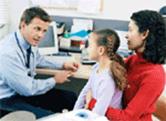|
What Everyone Should Know and Do
Snort. Sniffle. Sneeze. No Antibiotics Please!
|
"As a doctor and a mom, I know how sick you or your child can feel with a virus, but antibiotics just won't help. Talk with your doctor or nurse to find out what can help."
Dr. Cyndy Whitney, CDC's Respiratory Diseases Branch Chief. |
|
Are you aware that colds, flu, most sore throats, and bronchitis are caused by viruses? Did you know that antibiotics do not help fight viruses? It's true. Plus, taking antibiotics when you have a virus may do more harm than good. Taking antibiotics when they are not needed increases your risk of getting an infection later that resists antibiotic treatment.
| If You Have a Cold or Flu, Antibiotics Won't Work For You! |
 |
Antibiotics kill bacteria, not viruses such as:
- Colds or flu;
- Most coughs and bronchitis;
- Sore throats not caused by strep; or
- Runny noses.
|
 |
Taking antibiotics for viral infections, such as a cold, cough, the flu, or most bronchitis, will not:
- Cure the infections;
- Keep other individuals from catching the illness; or
- Help you feel better.
|
Get Smart…Read The Chart! to know which common illnesses are usually viral or bacterial and when antibiotics are necessary.
| What Can I Do To Protect Myself Or My Child? |
When you use antibiotics appropriately, you do the best for your health, your family's health, and the health of those around you. "We want Americans to keep their families and communities healthy by getting smart about the proper use of antibiotics," said Lauri Hicks, D.O., medical director of CDC's Get Smart campaign.
| What To Do  Talk with your healthcare provider about antibiotic resistance. Talk with your healthcare provider about antibiotic resistance.
 When you are prescribed an antibiotic, When you are prescribed an antibiotic,
- Take it exactly as the doctor tells you. Complete the prescribed course even if you are feeling better. If treatment stops too soon, some bacteria may survive and re-infect you.
- This goes for children, too. Make sure your children take all medication as prescribed, even if they feel better.
- Throw away any leftover medication once you have completed your prescription
Print and give out the Get Smart Prescription Adherence Sheet. |
|
|
What Not To Do
 Do not take an antibiotic for a viral infection like a cold, a cough, or the flu. Do not take an antibiotic for a viral infection like a cold, a cough, or the flu.  Do not demand antibiotics when a doctor says they are not needed. They will not help treat your infection. Do not demand antibiotics when a doctor says they are not needed. They will not help treat your infection.
 When you are prescribed an antibiotic, When you are prescribed an antibiotic,
- Do not skip doses.
- Do not save any antibiotics for the next time you get sick
- Do not take antibiotics prescribed for someone else. The antibiotic may not be appropriate for your illness. Taking the wrong medicine may delay correct treatment and allow bacteria to multiply.
|
|
| Dangers of Antibiotic Resistance |
 Antibiotic resistance has been called one of the world's most pressing public health problems. It can cause significant danger and suffering for people who have common infections that once were easily treatable with antibiotics. When antibiotics fail to work, the consequences are longer-lasting illnesses; more doctor visits or extended hospital stays; and the need for more expensive and toxic medications. Some resistant infections can cause death. Antibiotic resistance has been called one of the world's most pressing public health problems. It can cause significant danger and suffering for people who have common infections that once were easily treatable with antibiotics. When antibiotics fail to work, the consequences are longer-lasting illnesses; more doctor visits or extended hospital stays; and the need for more expensive and toxic medications. Some resistant infections can cause death.
Sick individuals aren't the only people who can suffer the consequences. Families and entire communities feel the impact when disease-causing germs become resistant to antibiotics. These antibiotic-resistant bacteria can quickly spread to family members, schoolmates and co-workers - threatening the community with a new strain of infectious disease that is more difficult to cure and more expensive to treat.
If you have more than 5 minutes...see all campaign materials.
- Taking antibiotics for viral infections will increase the risk of antibiotic resistance.
- Tens of millions of antibiotics prescribed in doctors' offices each year are for viral infections, which cannot effectively be treated with antibiotics. Doctors cite diagnostic uncertainty, time pressure on physicians, and patient demand as the primary reasons why antibiotics are over-prescribed.
- The spread of viral infections can be reduced through frequent hand washing and by avoiding close contact with others.
|
|